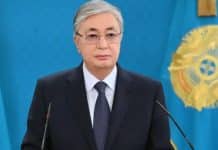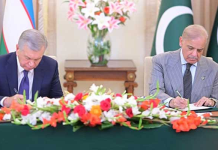WASHINGTON: Donald Trump’s return to the White House is raising hopes in Kazakhstan that long-reviled Jackson-Vanik trade restrictions will be repealed soon. More broadly, the incoming US administration is sending signals that a Biden administration initiative to improve political and trade ties with Central Asia will continue.
Repeal expectations in Astana are based on comments made by Secretary of State Marco Rubio during his confirmation hearings earlier in January at which he expressed a commitment to improving trade relations with Central Asian states. He described Jackson-Vanik as “an absurd relic of the past.”
The Jackson Vanik amendment was adopted during the latter stage of the Cold War as a lever to compel improved observance of basic rights by communist-led governments around the world, in particular the former Soviet Union. The measure linked access to US goods and services for communist states to their willingness to permit the freedom of movement and emigration.
Since the 1991 demise of the Soviet Union, Congress has lifted Jackson-Vanik restrictions for most formerly communist nations, giving them permanent normal trade relations status (PNTR). But Jackson-Vanik still applies to five formerly Soviet republics – Azerbaijan, Kazakhstan, Tajikistan Turkmenistan and Uzbekistan. Annual reviews are needed for those states to gain exemptions from the amendment’s provisions. Congressional approval is needed to lift the restrictions.
The United States during the Biden administration launched an initiative, known as B5+1, to boost westbound trade out of Central Asia by promoting regional connectivity. Rubio indicated that the new administration plans to continue promoting B5+1. Accordingly, Rubio indicated two key Central Asian states would be prioritized by Congress – Kazakhstan and Uzbekistan – for the awarding of PNTR.
Steve Daines, a Republican senator from Montana who is a leader of the congressional caucus on Central Asia, stated at Rubio’s confirmation hearing that the United States “needs more friends” in Central Asia. “This is a part of the world that is often neglected, but has such strategic importance,” he said. In response, Rubio agreed that improved relations between Washington and Central Asian states were “important.”
On his first day in office, Trump ordered a review of US trade arrangements with China, including a provision contained in the 2020 agreement in which Beijing committed to expanding imports from the United States. If US officials determine China is not in compliance, the United States may impose punitive measures “up to and including the imposition of tariffs or other measures as needed,” according to a memo issued by Trump.
US-China trade tension could result in Washington’s increased attention to and activity in Central Asia, which sits on China’s western frontier.
Valery Volodin, a Kazakh political scientist, said in an interview with Eurasianet that the United States wants to widen its access to Kazakhstan’s natural resources, such as uranium, oil, natural gas and rare earths. Saying Trump “knows what is good and what is bad for” the United States, Volodin added that he expects the US congress to lift Jackson-Vanik restrictions in the not-too-distant future.
“For Kazakhstan, this would be great news: our land is rich in natural resources and we have something to offer America,” Volodin said.

















